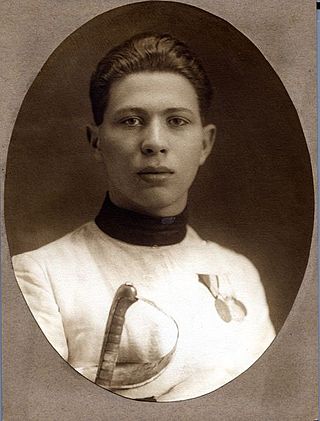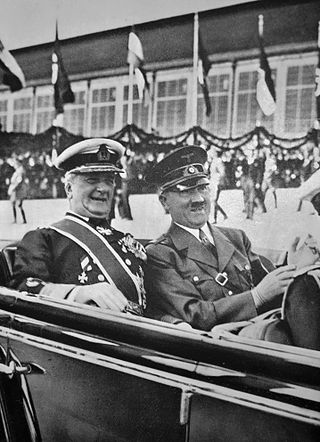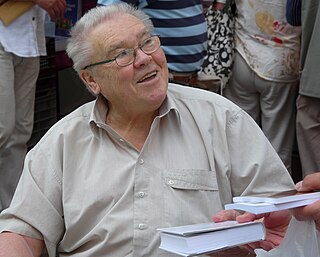Neo-Nazism comprises the post–World War II militant, social, and political movements that seek to revive and reinstate Nazi ideology. Neo-Nazis employ their ideology to promote hatred and racial supremacy, to attack racial and ethnic minorities, and in some cases to create a fascist state.

Fidesz – Hungarian Civic Alliance is a right-wing populist and national-conservative political party in Hungary, led by Viktor Orbán.

The Arrow Cross Party was a far-right Hungarian ultranationalist party led by Ferenc Szálasi, which formed a government in Hungary they named the Government of National Unity. They were in power from 15 October 1944 to 28 March 1945. During its short rule, ten to fifteen thousand civilians were murdered outright, including many Jews and Romani, and 80,000 people were deported from Hungary to concentration camps in Austria. After the war, Szálasi and other Arrow Cross leaders were tried as war criminals by Hungarian courts.

The Popular Association – Golden Dawn, usually shortened to Golden Dawn, is a far-right neo-Nazi ultranationalist criminal organization and former political party in Greece. Golden Dawn rose to prominence during Greece's financial crisis of 2009, becoming the third most popular party in the Greek parliament in the January 2015 election. Its support since plunged, and it failed to enter parliament in the 2019 election. The criminal trial against the leaders, frequently described as the largest trial of Nazis since the Nuremberg trials, lasted more than five years.

The siege of Budapest or battle of Budapest was the 50-day-long encirclement by Soviet and Romanian forces of the Hungarian capital of Budapest, near the end of World War II. Part of the broader Budapest Offensive, the siege began when Budapest, defended by Hungarian and German troops, was encircled on 26 December 1944 by the Red Army and the Romanian Army. During the siege, about 38,000 civilians died through starvation, military action, and mass executions of Jews by the far-right Hungarian nationalist Arrow Cross Party. The city unconditionally surrendered on 13 February 1945. It was a strategic victory for the Allies in their push towards Berlin.

The Jobbik – Conservatives, commonly known as Jobbik, is a conservative political party in Hungary.

Attila Petschauer was a Hungarian Olympic champion sabre fencer of Jewish heritage.

During World War II, the Kingdom of Hungary was a member of the Axis powers. In the 1930s, the Kingdom of Hungary relied on increased trade with Fascist Italy and Nazi Germany to pull itself out of the Great Depression. Hungarian politics and foreign policy had become more stridently nationalistic by 1938, and Hungary adopted an irredentist policy similar to Germany's, attempting to incorporate ethnic Hungarian areas in neighboring countries into Hungary. Hungary benefited territorially from its relationship with the Axis. Settlements were negotiated regarding territorial disputes with the Czechoslovak Republic, the Slovak Republic, and the Kingdom of Romania. On November 20, 1940, Hungary became the fourth member to join the Axis powers when it signed the Tripartite Pact. The following year, Hungarian forces participated in the invasion of Yugoslavia and the invasion of the Soviet Union. Their participation was noted by German observers for its particular cruelty, with occupied peoples subjected to arbitrary violence. Hungarian volunteers were sometimes referred to as engaging in "murder tourism."

László Endre was a Hungarian right-wing politician and collaborator with the Nazis during the Second World War.

Magyar Gárda Mozgalom founded by Magyar Gárda Hagyományőrző és Kulturális Egyesület was a patriotic-nationalistic association somewhat mimicking an army in its organisation and paraphernalia. It was coined a paramilitary, a party-militia, or – sarcastically – an operetta-guard by its opponents and certain media outlets, even though it was never armed. It was in varyingly close relationship with the Jobbik party in Hungary. It was founded through an "oath of loyalty to Hungary" by its members in Buda Castle, Budapest, on 25 August 2007. It was dissolved by the Budapest Tribunal on 2 July 2009. The president of the Association was Gábor Vona, and it had such prominent members as former (1990–1994) defence minister Lajos Für and actor Mátyás Usztics.

Krisztián Ungváry is a Hungarian historian of 20th century political and military history. He wrote about the siege of Budapest in World War II.

Ferenc Rajniss was a Hungarian journalist, socialite and fascist politician. He held pro-Nazi Germany views in Hungarian politics.

Hitlerszalonna, known in the modern day as sütésálló lekvár, is a dense fruit jam that originated in the Kingdom of Hungary during World War II. It was sold in brick shaped blocks held in a piece of paper, and was sliced like szalonna. Soldiers kept it in a case and it could be cooked with other foods. In the modern day, sütésálló lekvár is often sold in small portion cups. The term itself is considered slang and defined as something like "tough fruit".

Echo TV was a Christian-conservative Hungarian television channel owned and operated by Echo Hungária TV Zrt, and founded in 2005 to cover business news. Later focusing on news broadcasting and public affairs, it was known as a supporter of Fidesz and KDNP.

István Csurka was a Hungarian nationalist politician, journalist and writer. He was the founder and inaugural leader of the Hungarian Justice and Life Party (MIÉP) from 1993 until his death. He was also a Member of Parliament from 1990 to 1994 and from 1998 to 2002.

József Nyírő was a Hungarian writer of popular short stories and novels; a politician associated with fascism who was accused of war crimes; and briefly a Catholic priest in Miluani.
Antisemitism in contemporary Hungary principally takes the form of negative stereotypes relating to Jews, although historically it manifested itself more violently. Studies show antisemitism has become more prevalent since the fall of Communism, particularly among the younger generations. Surveys performed from 2009 and beyond have consistently found high levels of antisemitic feelings amongst the general population.

The Amadeu Antonio Foundation, established in 1998, is a German foundation engaging against far-right-wing parties, racism and antisemitism. It was founded by Karl Konrad Graf von der Groeben, with author Anetta Kahane appointed as its chairwoman and Wolfgang Thierse, the former president of the Bundestag, named as its patron.

Our Homeland Movement is a Hungarian far-right political party. It was founded by Ásotthalom mayor and former Jobbik Vice-President, László Toroczkai, along with other Jobbik dissidents that left the organization after the party's leadership moved away from its radical beginnings.

Zsolt Bayer is a Hungarian far-right and pro-Russian journalist, whose views have been widely described as racist, homophobic and transphobic, and antisemitic. He was a co-founder of the ruling Fidesz party and close confidant of Prime Minister Viktor Orbán. He is the owner of party membership card No. 5.

















